Mulching is the easiest and best way to maintain a healthy vegetable garden. Trust me, I found this out the hard way.
Before I learned this trick, maintaining my beds was a huge chore. One summer the weeds were so bad that I couldn’t even find my tomato plants!
I want to save you the pain I went through. So in this post I’ll tell you all you need to know. Including the benefits, what kinds to use, when to apply it, and lots of great tips for how to do it the right way.
Benefits Of Mulching Your Vegetable Garden
Not only does it add a nice, finished look to your beds, mulching your vegetable garden has many benefits too. All of these add up to a healthier, more attractive plot, and less maintenance for you.
- Controls weeds – A thick layer of mulch blocks out the sun and smothers weed seeds, which prevents them from germinating.
- Retains moisture – It also prevents water evaporation and keeps the soil moist longer, which means less watering for you.
- Regulates soil temperature – Mulch shades the ground, which keeps the soil and plant roots cooler, so your veggies are less susceptible to drought conditions in the heat of the summer.
- Prevents disease – Plus it prevents soil from splashing on the leaves, which helps to lessen the risk of soil borne diseases infecting your plants.
- Feeds the soil – The organic matter adds nutrients to the ground as it breaks down, and it attracts earthworms, both of which improve the quality and structure of the soil.
Related Post: No Dig Gardening 101: How To Start A No Till Garden
Best Types To Use
Always use a natural, organic material that is lightweight and will break down quickly. You can find out more in my list of the best types of mulch for your vegetable garden here. But below are a few examples:
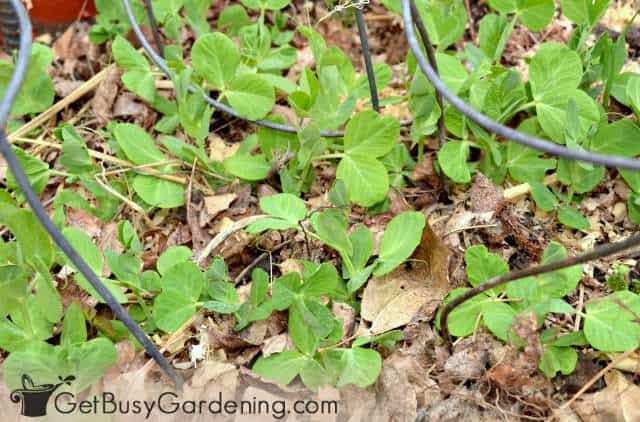
When To Mulch To Your Vegetable Garden
The best time to mulch your beds is in the spring either before or right after you plant your veggies.
I also like to add a fresh layer in the fall as I’m preparing my veggie beds for winter. This helps to prevent early spring weeds.
Don’t worry though, you can apply it at any time. Just be sure that you remove any large, established weeds beforehand, or they will probably find their way through.
Tips For Mulching Your Vegetable Garden
The steps are the same no matter if you have a traditional plot or raised beds. You can get my full step by step instructions for how to apply mulch to your garden here, but below are a few quick tips.
- For best results, apply a 3-4” deep layer. Anything less than 2″ won’t prevent weeds from growing, and going much deeper than 4″ could keep water from evenly wetting all areas of the soil.
- Avoid piling it around the base of your plants, as that can cause the stems to rot or hinder their growth (especially seedlings). Keep it a few inches away.
- Since they tend to break down fairly quickly, you may need to top-dress your veggie beds with more mulch in the late summer or early fall.
Mulching your vegetable garden is the best way to save time and energy. Once you get the hang of it, your soil will be healthier, and you will spend less time weeding and watering.
If you’d like to learn how to make the most of your space and get as much homegrown food as possible, then my Vertical Vegetables book is perfect! It will teach you all you need to know, has tons of gorgeous photos, and includes 23 DIY projects you can build for your own garden. Order your copy today!
Learn more about my Vertical Vegetables book here.
Share your tips for mulching a vegetable garden in the comments section below.
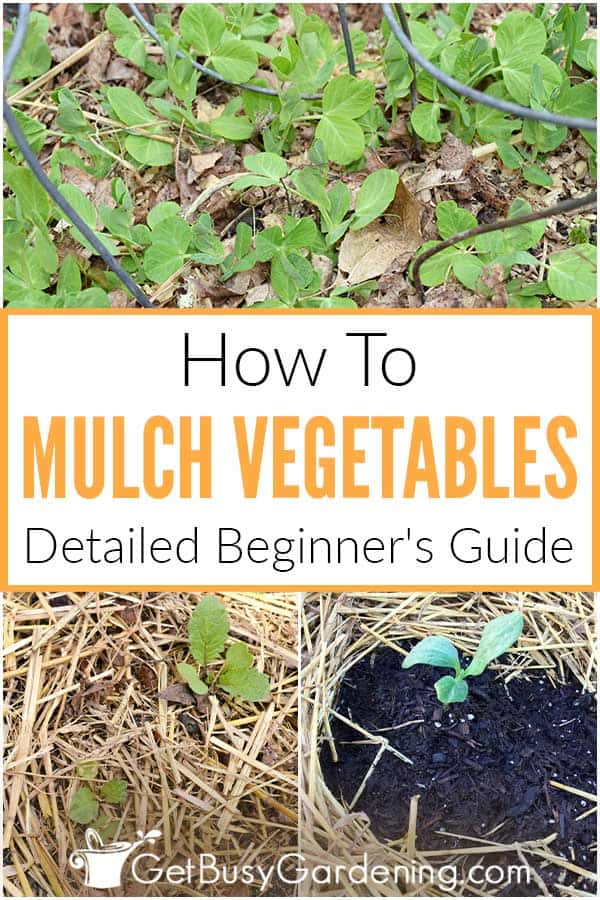
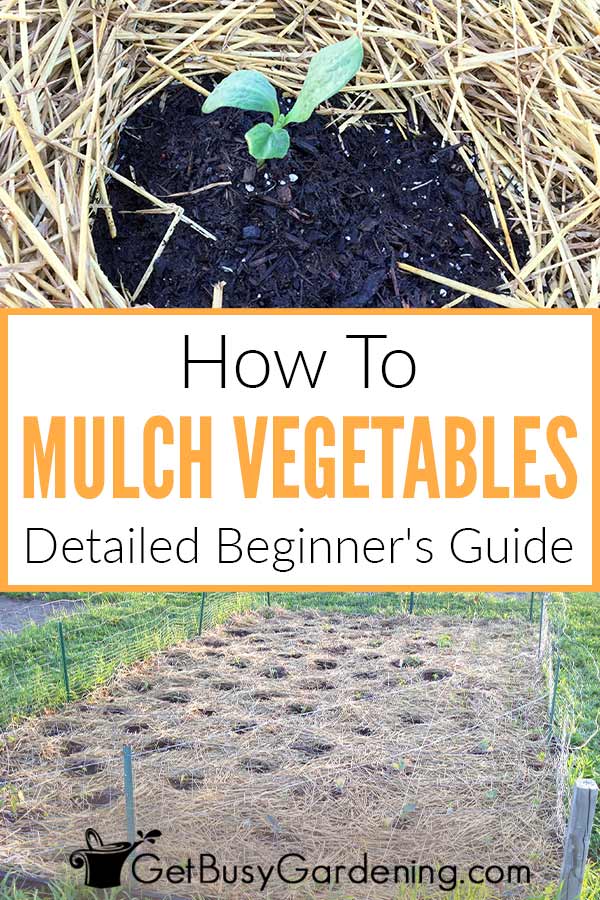
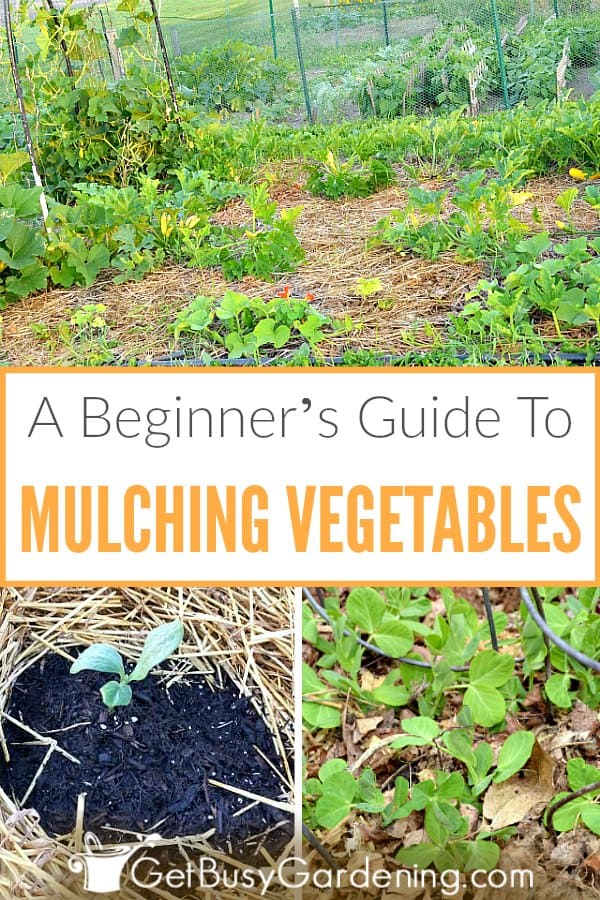
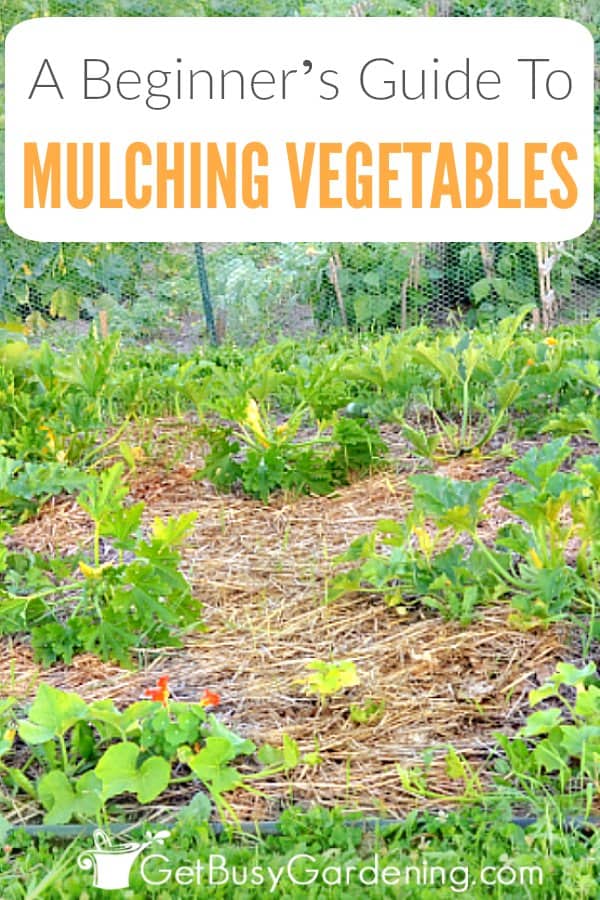
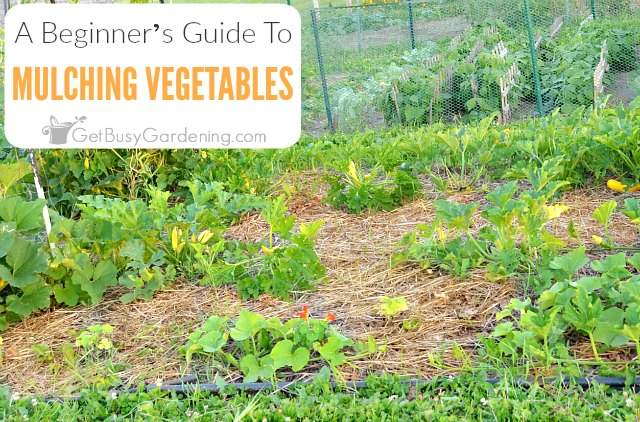

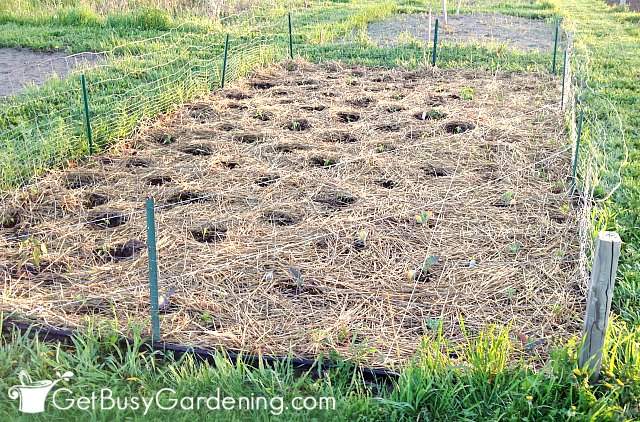
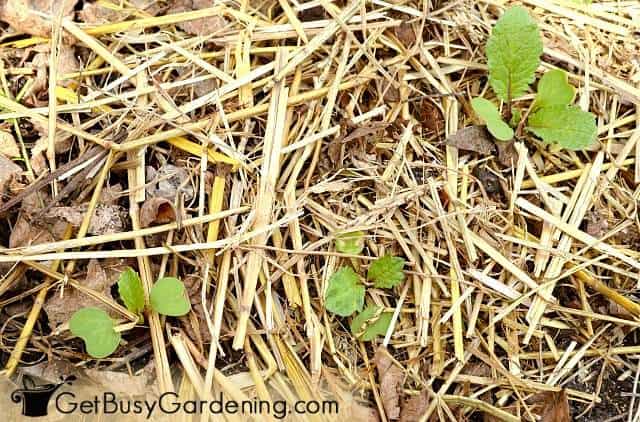
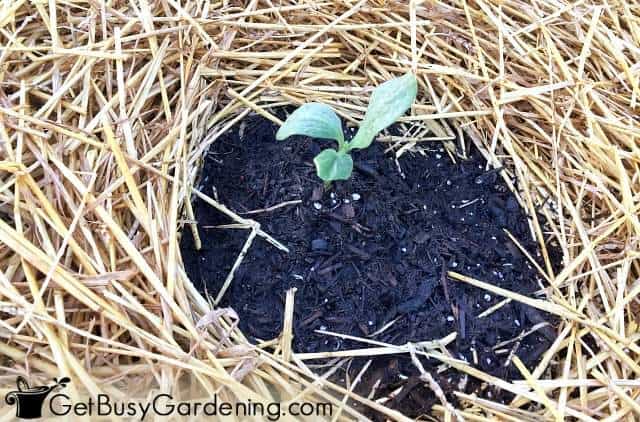
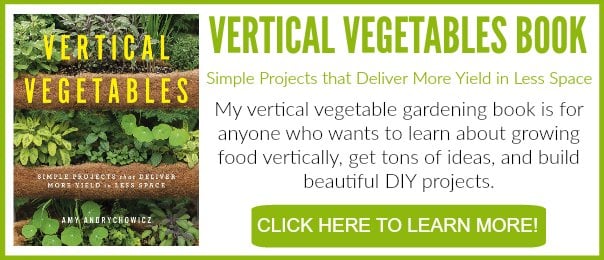

Patricia O'Byrne says
Can orchard hay be used as a mulch? for a small garden? Raised bed 4×13
vegetable garden.
Amy Andrychowicz says
I think that would work just fine. Just make sure the hay doesn’t have any seed heads in it, or it they will sprout all over. But they are easy to weed out if it does happen.
Harvey Feldman says
Can I use shredded red cedar mulch around my vegetable plants ??
Amy Andrychowicz says
You can use wood mulch in your vegetable garden, but it’s not the best choice. It doesn’t break down very fast, so it makes working the soil and replanting every year a bit of a pain, since it will be filled with thick chunks of wood. Also, I don’t recommend using dyed mulch in the vegetable garden. The dyes contain chemicals that can leach into the soil, and be absorbed by your plants. I’m not sure if that’s what you meant when you said “red” cedar or not, so I thought I’d mention it. 🙂
Mia says
How much weeding do you have to do before you place the mulch down? I have lot’s of tiny weeds coming up. Great article and comments.
Amy Andrychowicz says
Thanks, glad you enjoyed the article! If the weeds are tiny, I would just use a hoe to break them off, then mulch right over the top. Just make sure the mulch is thick enough to smother the weeds.
Spiros says
My gardener asked me to put cedar mulch all over my small vegetable garden bed (6×10)
I’m concern about the cucumber and tomato
Does cedar cause harm or change the taste ?
Thx
Amy Andrychowicz says
Not at all. The only downfall of using cedar mulch in a vegetable garden is that the hardwood doesn’t break down very fast. So it’s a bit more difficult to till/work the soil for planting again in the spring. You’ll have lots of wood chips in the soil. Other than that, there’s no harm in using cedar chips to mulch your veggie garden.
Julie hall says
Hi! Great article thank you. It’s always nice to hear of tips for a lower maintenance garden! It’s my first year gardening and my dad is helping me and swears that tree mulch is too acidic for the plants and the soil. I would like to put wood chips (oak mostly, we had some trees taken down a few months ago) in between the planting rows where we walk and then the lighter mulch or straw maybe were the plants are. Thoughts?? Thanks!!
Amy Andrychowicz says
Some types of trees (mainly pine trees) are acidic. However, it would take a lot of material to affect the acidity of the soil. Yes, putting a hardwood mulch on the paths, then a lighter mulch around the veggie plants is the way to go. As long as the paths in your vegetable garden don’t change from year to year, then hardwood is a great choice for them.
Brandon says
I have brown died mulch left over can I use it around the out side of my raised garden beds to keeps weeds and grass from growing up beside my garden beds?
Amy Andrychowicz says
Yes, I use natural hardwood mulch around my raised beds because it lasts longer than the mulch I use around the plants. It does a great job of keeping the weeds down, and I only have to refresh it every few years.
However, keep in mind that dyed mulch is not organic. They use chemicals to dye it, and those chemicals leach into the soil. So, if being organic is important to you, then I wouldn’t use the dyed mulch in your veggie beds. The mulch I use on my vegetable garden paths is an un-dyed hardwood cedar mulch.
Alyssa says
Lazybones here. Before I get out there and dig up + till my lawn for more veggie space, what are the odds I could just snuff out weeds with mulch and pop in vegetable starts in Georgia? I’m assuming too high of clay content but never hurts to ask 🙂
Amy Andrychowicz says
Yes, and that is called a “no dig” garden. But mulching alone probably won’t be enough to keep the grass and weeds from growing through. Plus it won’t give your veggies enough nutrients to grow their best for the first year. So, I recommend layering on lots of compost before mulching. Here’s a step-by-step instructions to help you out… How To Make A No Dig Garden.
don says
I have 18 5′ x 5′ raised bed boxes that I have been using straw mulch on. For tomatoes, peppers & eggplant. Can I reuse the straw or will it promote disease?
Amy Andrychowicz says
You can keep the straw mulch on your veggie garden beds, and just pile more on top. Or you can turn the old stuff into the soil before adding fresh straw on top. Plant diseases live in the soil, not the mulch.
Gina says
If a person uses straw as mulch, is it possible to use the tiller on the garden the following spring? I am caring for a neighbors garden who has never used mulch, I also put cardboard down first, but I am concerned about next spring since they like to use a tiller. Lots of clay and first garden at this house.
Amy Andrychowicz says
Yes, that’s the great part about using lightweight organic mulches in the vegetable garden. You can simply till them into the soil every year. They break down quickly, and add nutrients to the soil as they decompose. That will also help to break up that clay soil over time. The cardboard will be gone (or at least mostly gone) by spring too, so no concerns there. Win, win! 🙂
Suelizbe says
I am starting to use comfrey leaves, they will fertilizer the plants and be a weed barrier
Planning to use borage branches to do the same
Amy Andrychowicz says
Great, thanks for adding your favorite vegetable garden mulches. So fun to hear some new options!
Ron says
But be very careful with borage and comfrey as mulch – make sure there is no flowering on plant
Because of seeds . Same family and very invasive . Flower of borage eatable attract good bugs borage
But borage easy to pull but plenty grow . Be careful
Comfrey queen of the garden. I planted comfrey that is seed infertile .
stacia says
so do you plant first and then add the straw mulch keeping the area of the plant mulch free? sure wish I had known this earlier. we put in a green house this past summer (trust me NOT much of a gardener) and also a shed. greenhouse took a couple hours, shed took all summer. that being said the tractor we used pretty much dug up the grass killed it and then just left a large area of mud. for the winter we covered it with straw. tossed it so that we could seed. DARN!!!!! will try it next spring.
Amy Andrychowicz says
You can mulch your vegetable garden before or after planting (or both!). If you mulch it before planting, you can just move the mulch out of the way in each spot as you plant stuff. I always add leaf mulch to my vegetable beds in the fall, then add the straw mulch in the spring. Sometimes we spread it early in the spring before planting, and sometimes we wait until after.
lois morton says
still concerned on using cedar mulch on my vegetable garden? I worry that it will get too hot for the plants… any insight to this?
Amy Andrychowicz says
Actually, the mulch will help to keep the soil and plant roots cooler!! It also helps to hold in moisture longer, so the soil won’t dry out as fast. Using rock mulch is what bakes plants. 🙂
kklose says
I use shredded paper as my mulch in the garden. When it rains, it becomes wet and makes a great barrier. This barrier breaks down perfectly for the following year. In the spring, birds use it for their nests.
Amy Andrychowicz says
Wonderful idea for vegetable garden mulch, thanks for sharing!
Keesha Loraine says
What a great way of recycling paper. Thank you for the suggestion I will be busy mulching my vegetable garden today without worrying about having chunks of wood mulch in the way next year. Awesome!
Amy Andrychowicz says
Awesome! 🙂
Shaun Wapplea says
This is my second year with my vegetable garden and mulching has helped me enormously !!
I thought the weeds would just take over otherwise and by myself pulling the majority of them up would of been so back breaking and boring.
As I have a lot of grass cuttings I will continue and it also helps break up the clay soil.
Amy Andrychowicz says
Awesome!
Brigg Franklin says
The problem I had last year with straw mulch was that it had lots of Hay seed heads in the straw, so this year I have a large crop of wheat in the garden. It’s worse than my regular weeds.
Amy Andrychowicz says
I’ve had the seeds of the straw grow too, but they aren’t a huge problem for me. But the straw dies over the winter here. It must be warmer where you live that the straw is still growing this spring. Bummer! You can buy seedless straw bales. They are bit more expensive but something to try. Check your local garden center to see if they carry it.
Capt. Brigg Franklin says
This year I am using a layer of compost as mulch. The local WSU extension office and the Master Gardeners both recommend a compost mulch.
Amy Andrychowicz says
Awesome, let me know how that goes for you! I always wondered how they keep the weeds from growing in the compost, but maybe it’s a natural thing.
Capt. Brigg Franklin says
When properly handled, the compost itself has been internally heated to about 180 degrees through the decomposing process, killing all the weed seeds. If two inches of compost are applies as mulch, the weed seeds in the ground under the compost mulch are inhibited from reaching the surface.
Capt. Brigg; Master Composter Recycler:
John says
Great article on mulching. I’m a firm believer in the positive powers of mulching and agree with your insights into all the benefits.
I don’t till my vegetable garden, or really even turn it over, so I use wood chips and heavier mulches amongst my veggies as well as the shrub and flower beds.
Amy Andrychowicz says
Awesome! Do you find that you have to refresh the hardwood mulch every year after planting your vegetable garden? I had that problem when I put mulch into my annual garden, and that’s why I decided to use lighter mulches in my vegetable garden. I suppose it’s not any harder to refresh the hardwood mulch every year than it is to spread straw or leaves though. 🙂